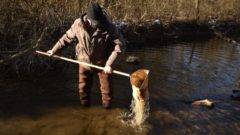Youth climate activists want an official seat at the table in Biden’s White House

By Ilana Cohen, Climate Tracker
This story originally appeared in Climate Tracker and is republished here as part of Covering Climate Now, a global journalism collaboration strengthening coverage of the climate story.
Last November, youth climate activists helped elect U.S.
Great Lakes Now
https://www.greatlakesnow.org/2021/02/youth-climate-activists-biden-white-house/
Water could make the Great Lakes a climate refuge. Are we prepared?
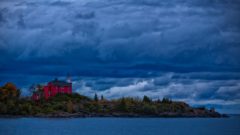
Michigan and the Great Lakes region — with an abundance of fresh water, warming winters and less fire-prone forests — stand to attract millions of new residents in the coming years looking to escape flooded coastal areas and the parched land of the West.
Great Lakes Now
https://www.greatlakesnow.org/2021/02/water-great-lakes-climate-refuge-prepared/
Excited about Biden: Detroit advocate hopeful on environmental justice progress after decades of inertia

Detroit’s Michelle Martinez is acutely aware of the patience needed when your profession is advocating for environmental justice, the fair and meaningful involvement of all people related to environmental laws and policies.
Martinez is acting executive director and statewide coordinator for the grassroots Michigan Environmental Justice Coalition.
It was 1994, almost three decades ago, that President Bill Clinton signed Executive Order 12898 putting the federal spotlight on environmental justice.
Great Lakes Now
https://www.greatlakesnow.org/2021/02/detroit-advocate-hopeful-environmental-justice-progress-decades-inertia/
Should future plans for Line 5 consider climate change?

The Great Lakes News Collaborative includes Bridge Michigan; Circle of Blue; Great Lakes Now at Detroit Public Television; and Michigan Radio, Michigan’s NPR News Leader; who work together to bring audiences news and information about the impact of climate change, pollution, and aging infrastructure on the Great Lakes and drinking water.
Great Lakes Now
https://www.greatlakesnow.org/2021/02/future-plans-line-5-climate-change/
Michigan is on thin ice. Get used to it, climate experts say.
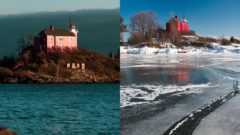
By Kelly House, Bridge Michigan, through the Institute for Nonprofit News network
The Great Lakes News Collaborative includes Bridge Michigan; Circle of Blue; Great Lakes Now at Detroit Public Television; and Michigan Radio, Michigan’s NPR News Leader; who work together to bring audiences news and information about the impact of climate change, pollution, and aging infrastructure on the Great Lakes and drinking water.
Great Lakes Now
https://www.greatlakesnow.org/2021/02/michigan-thin-ice-climate-experts/
Biden environmental challenge: Filling vacant scientist jobs
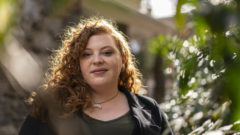
By Tammy Webber and Matthew Brown, Associated Press Writers
Polluting factories go uninspected by the U.S. Environmental Protection Agency. Leadership positions sit vacant at the U.S. Geological Survey’s climate science centers. And U.S. Department of Agriculture research into environmental issues important to farmers is unfinished.
The ranks of scientists who carry out environmental research, enforcement and other jobs fell in several agencies — sharply in some — under former President Donald Trump, federal data shows.
Great Lakes Now
https://www.greatlakesnow.org/2021/02/ap-biden-environmental-challenge-vacant-scientist-jobs/
Great Lakes seeing low ice cover compared to this time last year
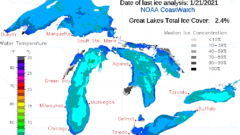
By Caroline Llanes, Michigan Radio
The Great Lakes News Collaborative includes Bridge Michigan; Circle of Blue; Great Lakes Now at Detroit Public Television; and Michigan Radio, Michigan’s NPR News Leader; who work together to bring audiences news and information about the impact of climate change, pollution, and aging infrastructure on the Great Lakes and drinking water.
Great Lakes Now
https://www.greatlakesnow.org/2021/01/great-lakes-low-ice-cover/
Crisis Response: President Biden has already kickstarted the country’s new approach to climate change
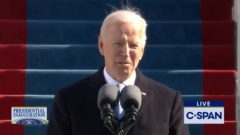
Water levels are swinging from one extreme to another. The Great Lakes are looking at an iceless, warm winter. Severe storms are hitting more frequently.
Climate change has been a contentious issue for the Great Lakes region – and the rest of the nation – as people debate the severity, impacts and need for action.
Great Lakes Now
https://www.greatlakesnow.org/2021/01/crisis-response-president-biden-approach-climate-change/
Lifeblood: Photographer shares the Lake Erie connection uniting shoreline residents

Along the shores of Lake Erie live a wide range of people whose lives might seem very familiar to or wildly distinctive from your own.
In the documentary photo series North of Long Tail, photographer Colin Boyd Shafer tells the stories of more than 20 residents of Lake Erie’s north shore.
Great Lakes Now
https://www.greatlakesnow.org/2021/01/lifeblood-photographer-lake-erie-shoreline-residents/
2020 in Review: Climate change, COVID-19 and Michigan’s governor
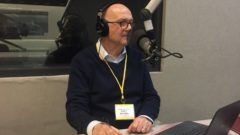
This is part of a series in which the Great Lakes Now staff looks back on 2020.
When I look back at my 2020 Great Lakes Now reporting, three themes jump off the page – Michigan Gov. Gretchen Whitmer, COVID-19 and climate change.
In her 2018 election campaign Whitmer articulated an extensive water and environment agenda and 2020 was the year she started to make progress on it.
Great Lakes Now
https://www.greatlakesnow.org/2021/01/2020-review-climate-change-covid-19-michigan-governor/
On the Pulse: I’ve Got One Word For You, 2020
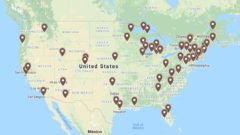
This is part of a series in which the Great Lakes Now staff looks back on 2020.
In any effort to sum up the year that was 2020, one word is unavoidable: poop.
Don’t you agree?
At Great Lakes Now, we’ve kept our finger on the pulse of poop news all year, because we care about our readers and viewers.
Great Lakes Now
https://www.greatlakesnow.org/2020/12/on-the-pulse-ive-got-one-word-for-you-2020/
2020 Vision: Great Lakes Now year in review predicts 2021
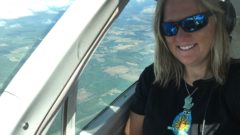
This is part of a series in which the Great Lakes Now staff looks back on 2020.
It’s probably futile to try to find ONE moment that captures 2020 for Great Lakes Now, at least from my view today at my dining room table/desk on a grey winter day.
Great Lakes Now
https://www.greatlakesnow.org/2020/12/great-lakes-now-year-in-review-predicts-2021/
Wisconsin climate task force releases its recommendations

By Scott Bauer, Associated Press Writer
MADISON, Wis. (AP) — A bipartisan task force that brought together environmentalists, the energy industry and others released its recommendations Wednesday for how Wisconsin might bolster its economy while addressing climate change.
The report from the task force, which was led by Lt.
Great Lakes Now
https://www.greatlakesnow.org/2020/12/ap-wisconsin-climate-task-force-recommendations/
Public Concern: Climate change, runoff and chemicals at the forefront of people’s worries about the Great Lakes
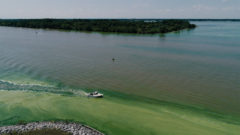
NOTE: The report will formally be presented in English at 2 p.m. ET on Thursday, Dec. 10. A French session will follow at 3:30 p.m. For more details about how you can watch or ask questions, click here.
Public concern about climate change is escalating in the Great Lakes region, according to a new report issued by a binational group that manages and protects the Great Lakes.
Great Lakes Now
https://www.greatlakesnow.org/2020/12/public-concern-climate-change-runoff-chemicals-ijc/
Index: International Joint Commission’s 2020 Triennial Assessment of Progress Report
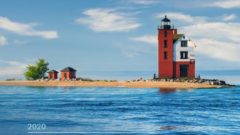
If you read the International Joint Commission’s 2020 Triennial Assessment of Progress Report or
watched the webinar where the IJC announced and discussed the findings, you might be curious about some of the other reports and documents referenced.
For the 2020 triennial report, go to the IJC’s website.
Great Lakes Now
https://www.greatlakesnow.org/2020/12/index-international-joint-commission-2020-triennial-assessment-of-progress-report/
WRI Fellow looks at what’s ahead for brook and brown trout amid Wisconsin’s changing hydrology
Dec. 8, 2020
By Jennifer A. Smith
While it’s not news to avid anglers, many Wisconsinites may be unaware that the Badger State has over 13,000 miles of coldwater streams that support many world-class fisheries for brook trout and brown trout.
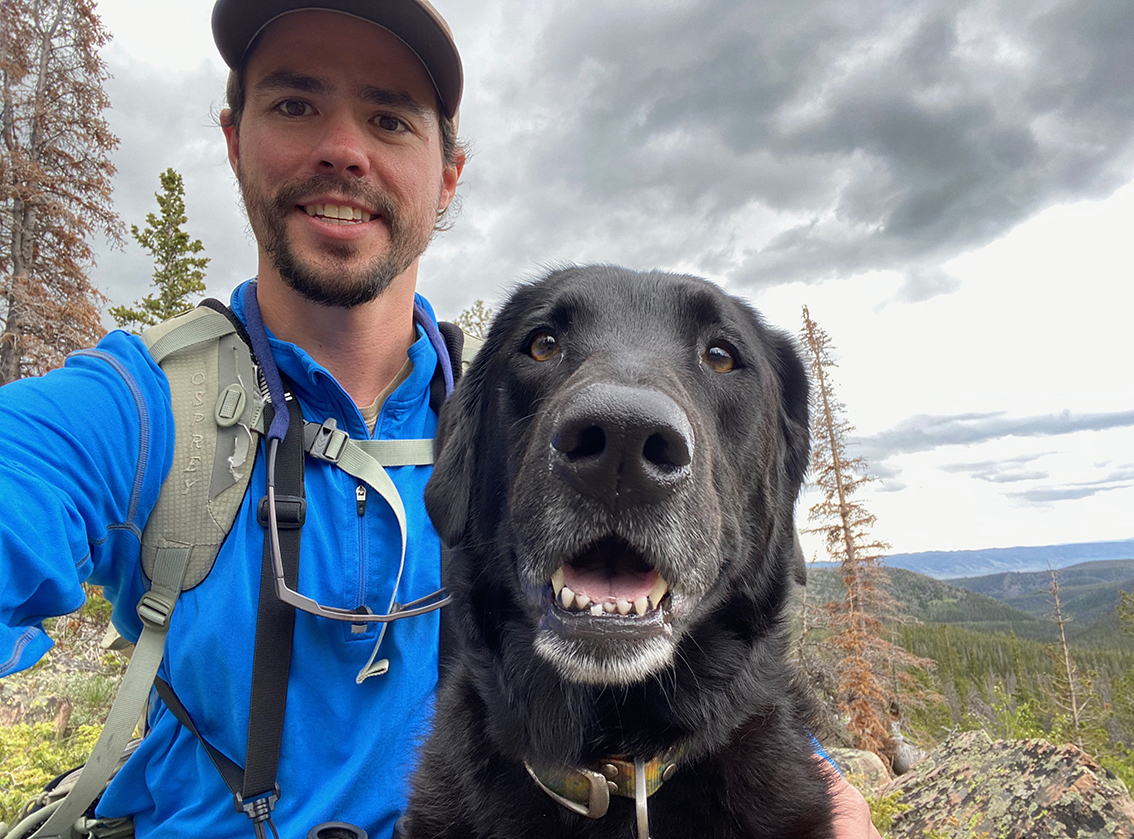
Coldwater streams are flowing waters with maximum summer temperatures under 72 degrees Fahrenheit. Trout living in these streams not only play an important role in ecosystems, but also represent significant economic value to the state. For example, according to research done by retired University of Wisconsin-La Crosse Professor Donna Anderson, trout fishing in Wisconsin’s Driftless region had an economic impact of $1.6 billion in 2015.
But these brook and brown trout face challenges. Two leading ones are climate change (and the resulting shifts in precipitation patterns and flood frequency) and high-capacity wells in the state, as those wells draw groundwater that might otherwise replenish streams.
Here to better understand these challenges—and ultimately help natural resource managers make decisions related to trout populations—is Bryan Maitland, a new Wisconsin Water Science-Policy Fellow whose position is jointly supported by the University of Wisconsin Water Resources Institute (WRI) and the Bureau of Fisheries Management at the Wisconsin Department of Natural Resources.
Maitland, who recently completed his doctorate in ecology at the University of Wyoming in Laramie, began his fellowship Sept. 1. He also holds a master’s degree in conservation biology from the University of Alberta in Canada. The fellowship is a one-year commitment with a possibility for a second year.
During this time, he’ll focus on building computer models that illuminate how long-term changes in hydrology across the state are affecting trout populations. “The flip side of this,” he said, “is the conservation and management side, translating it into some type of decision support tool that decision-makers can use to inform policy in the state.”
As Maitland elaborated, climate change has brought shifting precipitation patterns that have altered Wisconsin’s hydrology. Increased precipitation–and particularly the frequency of intense precipitation events–has triggered floods in rivers and streams statewide. Depending on their timing and severity, these floods can threaten the emergence of trout fry or the survival of juvenile trout.
For example, a big winter flood can “scour out these little trout eggs that are growing under the stream in the substrate” that time of year, said Maitland. As a result, that year class of fish could be wiped out since eggs will not hatch in the spring. “That age-zero year class is really important for long-term trout population dynamics, because if you don’t have a good age-zero cohort, you can have very depressed populations in the stream for multiple years after that,” he noted.
At the same time, some high-capacity wells have the potential to deplete groundwater levels, thereby reducing input into nearby streams.
“The reason we have 13,000 miles of streams is because we have really good groundwater here in Wisconsin and good input into streams, which helps keep these streams colder in the summer and a little warmer in winter,” said Maitland, creating a favorable environment for brook and brown trout.
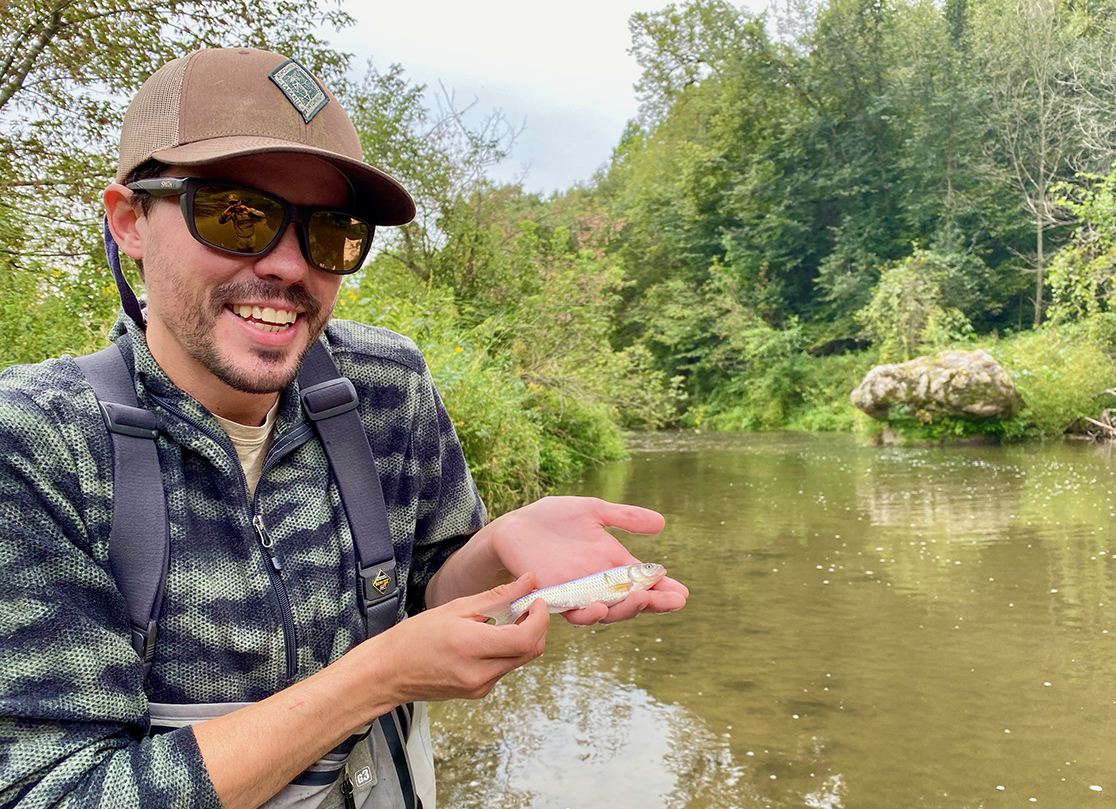
Maitland’s modeling work will pull together these two large-scale factors, and their interplay, to see how trout populations have been influenced over the past 26 years. Fish data collected from 1994 to 2020 are being used to inform the computer models to investigate how stream flow, precipitation and water temperature drive trout population numbers. Looking to the future, Maitland and collaborators will examine how increases or decreases in stream flow are likely to affect trout populations, with an eye to guiding a management framework for things like high-capacity well permits.
While economic considerations like the value of Wisconsin’s recreational trout fishery are outside the scope of his work, this effort could set the stage for other researchers to pursue this topic.
Maitland is an angler himself, which explains part of the appeal of this topic for him. Yet another draw is the chance to work with an array of other fellows and with permanent staff at the Wisconsin DNR. His collaborators at the DNR include former WRI fellow Alex Latzka, now a fisheries systems biologist there, and Lori Tate, section chief at the Fisheries Management Bureau and a member of Wisconsin Sea Grant’s Advisory Board. His efforts will intersect with that of other current fellows like Carolyn Voter and Dana Lapides.
“I think science and policy are team sports,” said Maitland. “To join such a big group of researchers and managers working on these big-picture issues in Wisconsin is very exciting.”
The post WRI Fellow looks at what’s ahead for brook and brown trout amid Wisconsin’s changing hydrology first appeared on WRI.
News Release – WRI
https://www.wri.wisc.edu/news/wri-fellow-looks-at-whats-ahead-for-brook-and-brown-trout/
Drinking Water News Roundup: Indiana utilities plan for climate change, Waukesha pipeline construction begins

From lead pipes to PFAS, drinking water contamination is a major issue plaguing cities and towns all around the Great Lakes. Cleaning up contaminants and providing safe water to everyone is an ongoing public health struggle.
Keep up with drinking water-related developments in the Great Lakes area.
Click on the headline to read the full story:
Indiana:
- ‘Will We Have Water When We Need It?’: How Indiana Utilities Are Preparing for Climate Change – Indiana Star
Just 150 miles from Lake Michigan, utility planners are worried about finding enough water to supply a growing Indianapolis because of climate change.
Great Lakes Now
https://www.greatlakesnow.org/2020/12/drinking-water-climate-change-lead-first-nations-waukesha-pipeline/
“Saving the Great Lakes”: National Geographic December issue explores the lakes and their struggles
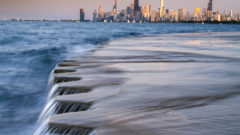
A familiar view for many who live and play around the Great Lakes graces the current cover of National Geographic – a stormy sunset over Lake Michigan, seen from the sandy beaches of the Sleeping Bear Dunes National Lakeshore.
The feature story of the magazine’s December 2020 issue puts a spotlight on the Great Lakes.
Great Lakes Now
https://www.greatlakesnow.org/2020/11/saving-great-lakes-national-geographic-december-issue-struggles/
Climate change threatens maple syrup production
Great Lakes Echo
http://greatlakesecho.org/2020/11/20/climate-change-threatens-maple-syrup-production/
As Great Lakes pummel Michigan, beach towns rush to set development rules
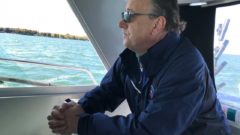
By Kelly House, Bridge Michigan
The Great Lakes News Collaborative includes Bridge Michigan; Circle of Blue; Great Lakes Now at Detroit Public Television; and Michigan Radio, Michigan’s NPR News Leader; who work together to bring audiences news and information about the impact of climate change, pollution, and aging infrastructure on the Great Lakes and drinking water.
Great Lakes Now
https://www.greatlakesnow.org/2020/11/great-lakes-pummel-michigan-beach-towns-development-rules/
Rollbacks, Climate, Justice: Environmental attorney on Biden’s commitments, opportunities and challenges

For President-elect Joe Biden, the environment and climate change as campaign issues weren’t tucked away in an obscure position paper. Neither was his intent to focus on environmental justice if elected.
Biden also put a spotlight on President Trump’s rollback via executive order of nearly 100 environmental protections in his four years.
Great Lakes Now
https://www.greatlakesnow.org/2020/11/rollbacks-climate-justice-environmental-attorney-president-elect-biden/
Q & A: The Great Lakes are stressed. Climate change is making it worse.

By Kelly House, Bridge Michigan, through the Institute for Nonprofit News network
The Great Lakes News Collaborative includes Bridge Michigan; Circle of Blue; Great Lakes Now at Detroit Public Television; and Michigan Radio, Michigan’s NPR News Leader; who work together to bring audiences news and information about the impact of climate change, pollution, and aging infrastructure on the Great Lakes and drinking water.
Great Lakes Now
https://www.greatlakesnow.org/2020/11/great-lakes-stressed-climate-change-worse/
As temperatures rise, Great Lakes region faces spike in Lyme disease
Great Lakes Echo
http://greatlakesecho.org/2020/11/10/as-temperatures-rise-great-lakes-region-faces-spike-in-lyme-disease/
Great Lakes produce new record for waterspouts in one week
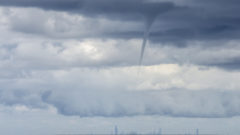
This article was republished here with permission from Great Lakes Echo.
By Audrey Porter, Great Lakes Echo
The Great Lakes produced a new high record in its number of 232 waterspouts from Sept. 28 through Oct. 4.
It tops the previous highest waterspout outbreak of 88 waterspouts in the month of August.
Great Lakes Now
https://www.greatlakesnow.org/2020/11/great-lakes-record-waterspouts/
Summertime Spike: Great Lakes parks a source of balm and vexation for many during COVID-19
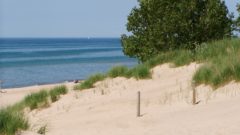
Great Lakes parks have always been popular among outdoor enthusiasts. This summer, however, pandemic-weary residents on both sides of the border flocked to them – many for the first time – just as services such as campsites, visitors’ centers, washrooms and interpretive programs were closed to help contain COVID-19.
The spike in summertime numbers was doubly challenging this year as the lakes’ record-high water levels have washed away some beaches and trails.
Great Lakes Now
https://www.greatlakesnow.org/2020/10/summertime-spike-great-lakes-parks-covid-19/
As policing and pandemic dominate election, climate pushed to back burner
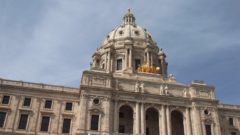
By Frank Jossi, Energy News Network, through the Institute for Nonprofit News network
State Sen. Jason Rarick co-sponsored a rare bipartisan energy bill this spring that sought to expand and improve Minnesota’s state energy conservation program.
The proposal earned support from unions, utilities, industry and environmental groups for its potential to save money and cut carbon emissions, but you won’t hear the Republican incumbent talking it up as part of his reelection campaign.
Great Lakes Now
https://www.greatlakesnow.org/2020/10/policing-pandemic-election-climate-minnesota/
Great Lakes Energy News Roundup: Michigan clean energy transition, pilot hydrogen production plant, Ohio nuclear bankruptcy ruling

Keep up with energy-related developments in the Great Lakes area with Great Lakes Now’s biweekly headline roundup.
In this edition: Michigan environmental justice advocates claim state can’t wait to 2050 for clean energy, Minnesota nuclear power plant to construct pilot facility to produce hydrogen energy, and Ohio nuclear energy company faces dangerous court motion from environmental groups.
Great Lakes Now
https://www.greatlakesnow.org/2020/10/great-lakes-energy-clean-energy-michigan-ohio-nuclear/
Great Aspirations: Great Lakes states grapple with climate change and carbon
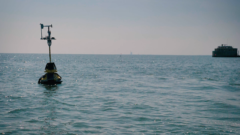
In June 2017, when President Donald Trump announced that the U.S. would withdraw from the Paris Climate Accords, three states had an immediate reaction and plan.
New York, California and Washington announced formation of the United States Climate Alliance calling it a “coalition that will convene U.S. states committed to upholding the Paris Climate Agreement and taking aggressive action on climate change.”
With that action, New York led Great Lakes states in the effort to reduce greenhouse gas emissions, establish clean energy plans and fund initiatives to meet carbon reduction goals.
Great Lakes Now
https://www.greatlakesnow.org/2020/10/great-lakes-states-climate-change-carbon/
Great Lakes Moment: Detroit River and western Lake Erie get a checkup
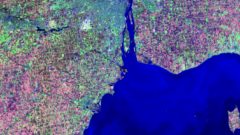
Great Lakes Moment is a monthly column written by Great Lakes Now Contributor John Hartig. Publishing the author’s views and assertions does not represent endorsement by Great Lakes Now or Detroit Public Television.
If the Detroit River and western Lake Erie were patients undergoing their annual exam, a doctor would probably say, “I have good news and bad news about their health.”
The good news is that there are signs of improving ecosystem health including the return of creatures like bald eagles, peregrine falcons, osprey, lake sturgeon, lake whitefish and beaver.
Great Lakes Now
https://www.greatlakesnow.org/2020/10/state-of-the-strait-2020-detroit-river-western-lake-erie/
Policy Expert Q&A: Keep advocating with elected officials for safe drinking water

The Flint water crisis that made national and international headlines was a failure on many levels, according to University of Chicago Professor Sabina Shaikh.
Particularly, it was a public policy failure, Shaikh told Great Lakes Now in an interview, and the failure in Flint put a spotlight on environmental injustices.
Great Lakes Now
https://www.greatlakesnow.org/2020/09/policy-expert-advocating-elected-officials-safe-drinking-water/
Can the Climate Youth Tip the 2020 Election Against Trump?

By Mark Hertsgaard, The Nation
This story originally appeared in The Nation and is republished here as part of Covering Climate Now, a global journalism collaboration strengthening coverage of the climate story.
On Monday, The Nation and other Covering Climate Now partners held a “First-Time Voter Youth Day” to highlight the voices of the generation most affected by climate change as we launch a week of joint coverage of Climate Politics 2020.
Great Lakes Now
https://www.greatlakesnow.org/2020/09/climate-youth-2020-election-trump/
Want the Youth Vote? Prioritize Climate Change

By Jacob Wallace, The Nation
This story originally appeared in The Nation and is republished here as part of Covering Climate Now, a global journalism collaboration strengthening coverage of the climate story.
In the speech she gave at the People’s Climate March in Washington in 2017, Jansikwe Medina-Tayac, then 15, told a crowd of thousands, “This [climate change] is not just an environmental issue.
Great Lakes Now
https://www.greatlakesnow.org/2020/09/election-2020-youth-vote-prioritize-climate-change/
Intersecting Crises: Fighting for climate justice in a pandemic
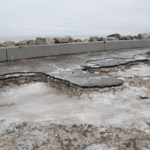
Alongside the illnesses, deaths and closures caused by COVID-19, the threat of climate change still hangs over communities across the Great Lakes region and around the world. And the people and organizations fighting against climate change and for environmental justice have found themselves caught between these two threats to public health.
Great Lakes Now
https://www.greatlakesnow.org/2020/08/intersecting-crises-climate-change-justice-covid-19/
Above Average: Great Lakes water temperatures keep high after record-breaking July

Lake Ontario broke a record this July for hottest surface water temperature ever recorded on the lake since 1995.
Lake Ontario isn’t alone. All five of the Great Lakes’ surface water temperatures are still above their 1995-2020 averages as of Aug. 21, according to NOAA Great Lakes CoastWatch.
Great Lakes Now
https://www.greatlakesnow.org/2020/08/great-lakes-water-temperatures-high/
One key solution to the world’s climate woes? Canada’s natural landscapes
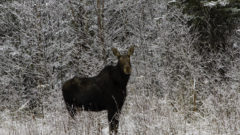
By Jimmy Thomson, The Narwhal
This story originally appeared in The Narwhal and is republished here as part of Covering Climate Now, a global journalism collaboration strengthening coverage of the climate story.
This is the first part of Carbon Cache, an ongoing series about nature-based climate solutions.
Great Lakes Now
https://www.greatlakesnow.org/2020/08/climate-change-carbon-canada-natural-landscapes/
A vacant lot in Gary, Indiana, will soon be home to a climate-friendly community
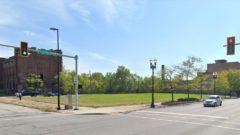
By Audrey Henderson, Energy News Network, through the Institute for Nonprofit News network
An area in downtown Gary, Indiana, that still bears scars from a 1997 arson fire will soon boast an affordable housing complex with an eye toward energy efficiency and neighborhood revitalization.
The $11 million Broadway Lofts project, scheduled to break ground September 1 for completion in 2021, is part of Indiana’s Moving Forward incentive that targets net-zero, transit-oriented affordable housing.
Great Lakes Now
https://www.greatlakesnow.org/2020/08/gary-indiana-climate-friendly-community/
Survey analysis finds race plays role in perception, vulnerabilities to climate change in Indiana
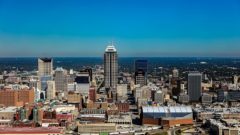
By Enrique Saenz, Indiana Environmental Reporter
People across the U.S. are taking to the streets to protest racial inequity, saying that people of color experience a wholly different experience in the country than white Americans. New findings from a statewide survey indicate that the disparity extends to how Hoosiers of different races perceive climate change and its risks.
Great Lakes Now
https://www.greatlakesnow.org/2020/08/race-perception-vulnerabilities-climate-change-indiana/
Across America, Five Communities in Search of Environmental Justice

By Kristoffer Tigue, Nicholas Kusnetz, Judy Fahys, Ilana Cohen and David Hasemyer, InsideClimate News
This story originally appeared in InsideClimate News and is republished here as part of Covering Climate Now, a global journalism collaboration strengthening coverage of the climate story.
In many ways, Maleta Kimmons defines her neighborhood by what it lacks.
Great Lakes Now
https://www.greatlakesnow.org/2020/08/communities-minnesota-new-york-environmental-justice/
Review Underway: Will IJC’s efforts be enough for flooded shoreline municipalities?
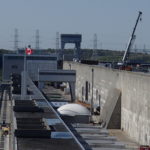
The International Joint Commission has started an early review of its Lake Ontario water management plan, overseen by a board that includes some of its most ardent critics, in response to extensive flooding and outcry from the lake’s shoreline communities.
The IJC— the international body that regulates waterways between the United States and Canada — has received $1.5 million in funding from the U.S., with an additional $1.5 million in matched funds from Canada, for the expedited review of Plan 2014.
Great Lakes Now
https://www.greatlakesnow.org/2020/07/review-underway-ijc-lake-ontario-flooded-shoreline/
Rich Americans spew more carbon pollution at home than poor
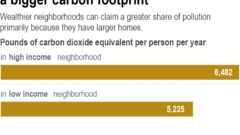
By Seth Borenstein, AP Science Writer
Rich Americans produce nearly 25% more heat-trapping gases than poorer people at home, according to a comprehensive study of U.S. residential carbon footprints.
Scientists studied 93 million housing units in the nation to analyze how much greenhouse gases are being spewed in different locations and by income, according to a study published Monday in the Proceedings of the National Academy of Sciences.
Great Lakes Now
https://www.greatlakesnow.org/2020/07/ap-rich-american-more-carbon-pollution-poor/
Hot summer warming up Lake Michigan, experts say
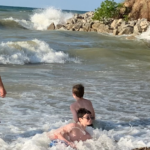
TRAVERSE CITY, Mich. (AP) — Lake Michigan is having a warm summer.
The average surface water temperature was 75.3 degrees on July 9, setting a record for the month based on 26 years of record keeping, government scientists said.
The summer high is 75.6 degrees recorded in August 2016, according to the National Oceanic and Atmospheric Administration or NOAA.
Great Lakes Now
https://www.greatlakesnow.org/2020/07/ap-hot-summer-lake-michigan/
Great Lakes Moment: Warmer, wetter, wilder
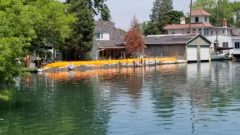
Great Lakes Moment is a monthly column written by Great Lakes Now Contributor John Hartig. Publishing the author’s views and assertions does not represent endorsement by Great Lakes Now or Detroit Public Television.
Scientists have predicted that warmer, wetter and wilder weather is coming and that this will be one of the greatest environmental challenges of the 21st Century.
Great Lakes Now
https://www.greatlakesnow.org/2020/07/water-levels-climate-change-warmer-wetter-wilder/
Great Lakes Energy News Roundup: Lake Huron nuclear waste storage plan dropped, renewable energy in Midland
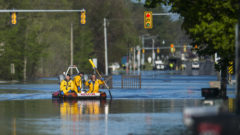
Keep up with energy-related developments in the Great Lakes area with Great Lakes Now’s biweekly headline roundup.
In this edition: Ontario Power Generation formally withdraws its application to construct a repository for nuclear waste near Lake Huron; Illinois looks to construct offshore energy wind turbines but faces resistance; University of Minnesota may expand viability of geothermal energy in Midwest; and flood-ravaged Midland, Michigan, coming around on renewable energy.
Great Lakes Now
https://www.greatlakesnow.org/2020/06/energy-nuclear-huron-renewables-midland-wind-geothermal/
Freshwater Weekly: June 15th, 2020
June 12, 2020
This week: Speaking Common Threads in Our Communities Through Poetry +No Water Service Restoration Chicago+ Anishinaabe Lead on Adapting to Climate Change + Michigan Senators Introduce a Bill to Protect Waterways and Public Health
Speaking of Common Threads in Our Communities Through Poetry
Freshwater Future staff member Brandon Tyus expressed his reactions to George Floyd’s murder through poetry. His poem titled Dear White People reflects on the personal belief system that “the game doesn’t change, but the faces do” as there is always a common thread in anything that shares fundamental commonalities such as skin color. The poem’s voice from the viewpoint of black and brown people asks white people to gain perspective, because they cannot understand what life is like with darker skin.
No Water Service Restoration in Chicago During PandemicThe City of Chicago has yet to restore water service to a single home, leaving an untold number of families without running water during the pandemic. Many cities across the Great Lakes region have been scrambling to reconnect users so they can wash their hands to prevent the spread of Covid-19, at least temporarily. Rising water costs in many cities in the region have led to disconnections when residents fall behind on water bills. Even after Freshwater Future negotiated a small pilot to turn on the water for a single home, the City has not been able to find the will for reconnection. Anishinaabe Tribes Lead on Adapting to Climate ChangeAnishinaabe tribes in northern Minnesota, Wisconsin, and Michigan are taking a holistic approach toward dealing with climate change that requires more “listening” to nature than battling it. Tribal adaptation is an approach that notices the changes in climate and experiments with what needs to be adjusted to accommodate the change. Tribes have formed a coalition, putting them in a leadership role for building resilience to climate change impacts. Michigan Senators Introduce A Bill To Protect Waterways And Public HealthAfter an industrial property contaminated with uranium and other hazardous chemicals collapsed into the Detroit River as we reported in December 2019. This environmental disaster revealed inadequate enforcement by the Michigan Department of Environment, Great Lakes and Energy (EGLE). In response to this and similar instances of dangerous pollutants entering waterways, State legislators introduced a bill to protect major waterways and public health. The legislation would require statewide risk assessments and an accessible database for the public to more easily identify contaminated areas throughout the state. |
Blog – Freshwater Future
https://freshwaterfuture.org/uncategorized/freshwater-weekly-june-15th-2020/
Green Reset: COVID-19 offers opportunity for lighter environmental impact
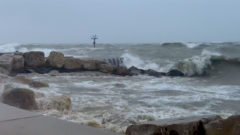
Out of the tragedy that is COVID-19 can come opportunities to improve our lives, our workspace and our environment.
That includes softening the impact we have on natural habitat.
That’s the view of veteran Great Lakes executive Cameron Davis who says, like businesses in big cities that are assessing their space needs, we should pause and assess our impact on the environment.
Great Lakes Now
https://www.greatlakesnow.org/2020/06/green-reset-covid-19-offers-opportunity-for-lighter-environmental-impact/
Undergraduate research scholars tackle issues relevant to Great Lakes communities
As participants in the University of Wisconsin-Madison’s Undergraduate Research Scholars (URS) program know, it’s never too soon to gain exposure to the kind of research that goes on at a large university.
The URS program is designed as a two-semester course aimed at first- and second-year students. Participants take a weekly seminar and are paired with a research mentor who guides them as they conduct an original research project. Near the conclusion of the academic year, students present their research at a symposium.
While the COVID-19 pandemic meant that students finished out this spring semester at their permanent homes rather than on campus—and that the typical in-person symposium was replaced by virtual presentations—it still proved to be a valuable experience for two students mentored by Wisconsin Sea Grant Assistant Director for Extension David Hart.
Rykia Amos of Washington, D.C., and Celeste Gunderson of Milwaukee each zeroed in on challenging topics. We checked in with both to hear about their experiences.
Rykia Amos
Topic: A process to prioritize where to plant trees to decrease future stream temperatures to protect brook trout in the Black Earth Creek watershed
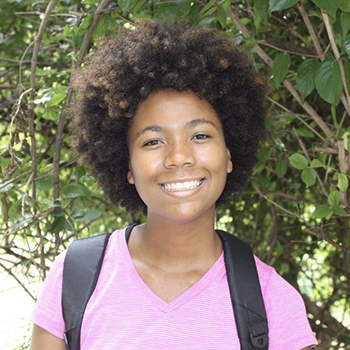
Rykia Amos (Submitted photo)
A wildlife ecology major, Amos went into her trout project as someone more focused on mammals. Yet, she said, “I realized I was a lot more interested in looking at fish than I expected.”
Trout fishing is a popular activity that also carries significant economic value in Wisconsin. Yet climate change projections and warming streams are worrisome. Said Amos, “They’re (brook trout) a very vulnerable species because most of them currently live in cold-water conditions.”
If the climate continues to warm as current scientific projections say, what will that mean for fish like the brook trout and brown trout?
Amos focused on the role played by tree cover and whether that can help mitigate warming temperatures in certain stream segments, to the benefit of the fish. “Data shows that tree planting is a cost-efficient and effective way to help temperatures decrease,” said Amos.
She used data from a U.S. Geological Survey program called FishVis to populate a spreadsheet of stream segments in the Black Earth Creek watershed, located west of Madison. She looked at both present conditions and projected conditions for the period 2046-2065.
Important variables that she considered were where the stream was projected to change from a colder to warmer temperature regime and where brook trout populations were being replaced by brown trout, which can tolerate warmer temperatures. She concluded by assessing the existing tree canopy and developing a formula to prioritize the variables.
At semester’s end, Amos presented her research first to Hart and Sea Grant Fisheries Specialist Titus Seilheimer. She then gave a separate presentation to Matt Mitro, a research scientist with the Wisconsin Department of Natural Resources. Mitro had given input earlier in the semester, suggesting to Amos that she compare brook and brown trout.
Even though she’d prefer to focus on hands-on fieldwork in the future, Amos said, the computer modeling she undertook for her research gave her a window into a real-life challenge posed by climate change in our region. This work has relevance for the protection of ecosystems as well as the recreational fishing that many Wisconsinites love.
Said Hart, “I think there’s a lot of promise for this prioritization of the areas where you could plant tree cover and it would make a difference to decrease stream temperatures. As far as methods went, it was a great proof of concept.”
Going forward, this work could be expanded upon by adding more variables to the modeling, such as land ownership (which could impact the feasibility of tree planting). Hart has begun to look into a tool for constructing 3D tree canopy models from LiDAR (Light Detection and Ranging) data and thinking about how that could come into play. “I wouldn’t have thought of this if I hadn’t worked with Rykia on this project,” he said.
Celeste Gunderson
Topic: Geodesign to guide green infrastructure practices for stormwater management in a changing climate

Celeste Gunderson (Submitted photo)
Gunderson, a resident of Milwaukee’s east side, examined an issue that is literally close to home for her: the impacts of climate change on residents of Great Lakes communities, and how increased precipitation events and severe weather affect lives and property.
It’s an issue her family faced in 2008, when Milwaukee endured widespread flooding caused by heavy precipitation. “It had a lot of effects on the foundation of our house,” said Gunderson, “and we had to get construction done… We’ve already felt the effects of increased precipitation and severe weather events.”
Gunderson is double majoring in environmental studies and people-environment geography. She explored mitigation strategies using a tool called GeoPlanner for ArcGIS, a geographic information systems product that allows users to create and analyze various planning scenarios.
With guidance from Hart and graduate project assistant Kayla Wandsnider, said Gunderson, “We looked at how geodesign—which is a process using GIS technology to look at different planning scenarios—could be used to then guide green infrastructure practices for stormwater management” in the part of the UW-Madison campus that drains to Willow Creek, specifically with an increase in precipitation.
She gave her stakeholder presentation to UW-Madison’s Rhonda James, a senior landscape architect, and Aaron Williams, an assistant planner and zoning coordinator. Both are with the campus Division of Facilities Planning and Management.
Gunderson will continue working on this topic over the summer as a Wisconsin Sea Grant intern.
Said Hart, “Celeste will be a real help. She made a great connection with Kayla, and together they will be able to bounce ideas off of each other and it will also magnify Kayla’s work” as a graduate student with a double focus on urban and regional planning and water resources management. “I think that the methods developed out of this [project] will be really useful for coastal communities.”
Continuing to focus on this area will also be gratifying for the Milwaukeean. Concluded Gunderson, “Sometimes you learn the science behind climate change, and this project explores the direct impacts and ways we’re going to have to adapt in the future… It felt very relevant and important, and that made it a very fulfilling experience.”
News Releases – Wisconsin Sea Grant
News Releases – Wisconsin Sea Grant
https://www.seagrant.wisc.edu/news/undergraduate-research-scholars-tackle-issues-relevant-to-great-lakes-communities/
Indiana Dunes starts beach parking information line

PORTER, Ind. (AP) — Indiana Dunes National Park has started an information line to help visitors find an open beach with available parking amid severe shoreline erosion along Lake Michigan and the need for social distancing.
Beginning Saturday morning, visitors can call 219-395-1003 to hear recorded information on available parking at Indiana Dunes National Park beaches and nearby Indiana Dunes State Park.
Great Lakes Now
https://www.greatlakesnow.org/2020/05/ap-indiana-dunes-covid-19-beach-parking/
More Than Dow: Chemicals, contaminants and untreated sewage all washed out by Midland dam breaks
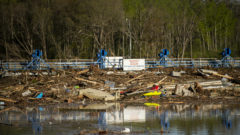
A lot of focus has been placed on Dow Chemical Company—which is headquartered in Midland, Michigan—after two dams breached and flooded many areas around Midland County including near a Superfund site.
Dow stated in a press release Thursday that there were “no reported product releases” and though the floodwaters entered an on-site brine pond used for groundwater remediation, “material from the brine pond does not create any risk to residents or the environment.”
But while there might not be new contamination issues to deal with, much of the progress on the cleanup of Dow’s last chemical contamination might be lost.
Great Lakes Now
https://www.greatlakesnow.org/2020/05/chemicals-contaminants-untreated-sewage-midland-dam-breaks/
Is America prepared to handle natural disasters during the COVID-19 pandemic?

By Ari Kelo, theRising
This story originally appeared in theRising and is republished here as part of Covering Climate Now, a global journalism collaboration strengthening coverage of the climate story.
From lengthened hurricane seasons to deadly bushfires, the natural disasters symptomatic of climate change are becoming more and more pronounced each year.
Great Lakes Now
https://www.greatlakesnow.org/2020/05/america-prepared-natural-disasters-covid-19-coronavirus/

